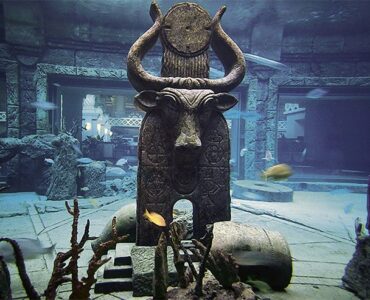The Amphora of Anesidora; more commonly called Pandora, or Pandora’s Box—this symbolism undoubtedly carries the same meaning as that of Adam and Eve eating the apple.
In Greek mythology, Pandora is the first woman. She is associated with the legend of Pandora’s box (actually a jar). She is sometimes called Anesidora, “the one who brings gifts from below”, in fact the Earth Goddess who presides over fertility.
Pandora was created by order of Zeus, who wanted to take revenge on men for the theft of fire (sexual energy) by Prometheus (Lucifer).
She was fashioned from clay and water by Hephaestus; Athena then gave her life, taught her manual skill (among other things, the art of weaving), and clothed her; Aphrodite gave her beauty; Apollo gave her musical talent, Hermes taught her lying and the art of persuasion and gave her curiosity; finally, Hera gave her jealousy.
Zeus offered Pandora’s hand to Epimetheus, Prometheus’s brother. Although he had promised Prometheus to refuse any gifts from Zeus, Epimetheus accepted Pandora. She brought with her a mysterious box that Zeus had forbidden her to open.
A spilled amphora of water, an overturned cup of wine, a secret box that must not be opened, a fruit that must not be eaten under the warning of a serpent—this symbolism appears in all cultures of the world.
That box contained all the evils of humanity, including Old Age, Disease, War, Famine, Misery, Madness, Vice, Deceit, Passion, as well as Hope.
Once settled as a wife, Pandora gave in to the curiosity Hermes had instilled in her and opened the box, releasing the evils it contained. She tried to close it again to trap them; alas, it was too late! Only Hope, slower to react, remained inside. The box she had opened then became known as Pandora’s Box.
It is the Iliad, in verses 527 and following of Book XXIV, that uses this term: in the house of Zeus, there were two jars—one holding blessings, the other holding evils.


















